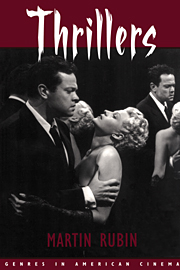Summary
The label thriller is widely used but highly problematic. To the foolhardy writer setting out to define the subject, it might seem impossibly broad and vague.
The American mass-circulation magazine TV Guide includes “Thriller” as one of the categories used to describe the movies in its weekly listings. However, the way this label is applied seems more arbitrary than illuminating. In one randomly selected week, the tongue-in-cheek horror film Basket Case (1982) was listed as a Thriller, while its sequel Basket Case 2 (1990) was deemed a Comedy. Black Widow (1987), in which a policewoman sets out to snare a psychotic femme fatale who targets wealthy businessmen, was designated a Thriller, whereas The Banker (1989), in which a policeman sets out to snare a psychotic businessman who targets prostitutes, was considered a Crime Drama. Michael Crichton's Looker (1981), mixing speculative technology with murder investigation, was listed as a Thriller, yet the similarly themed Coma (1978, directed by Crichton) and The Terminal Man (1974, based on a Crichton novel) came under the headings of Mystery and Science Fiction, respectively.
An anthology series entitled Thriller, hosted by horror icon Boris Karloff, ran on the NBC network from 1960 to 1962, during which time it presented a wide-ranging variety of ghost, horror, mystery, spy, gangster, and crime stories - backed by the host's authoritative assertion, “Let me assure you, my friends, this is a thriller!” Lawrence Hammond's 1974 book Thriller Movies and John McCarty's 1992 book Thrillers both specifically exclude horror films from their surveys; but the lyrics of pop singer Michael Jackson's 1982 hit “Thriller” (as well as the visuals of its music video) concentrate exclusively on horror-film imagery.
- Type
- Chapter
- Information
- Thrillers , pp. 3 - 8Publisher: Cambridge University PressPrint publication year: 1999
- 1
- Cited by

